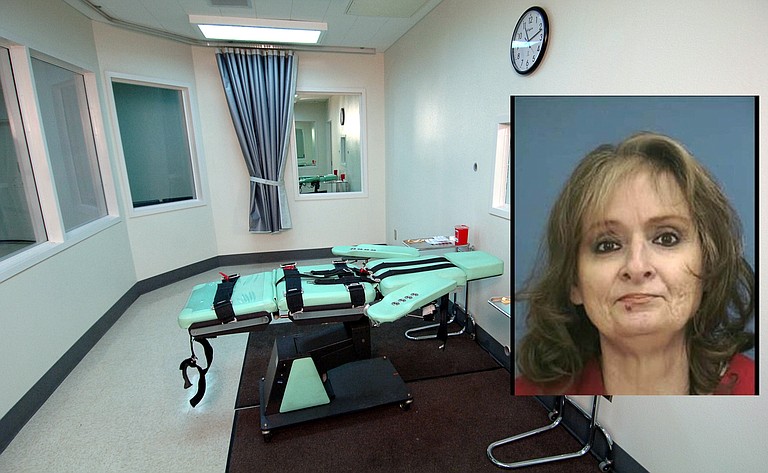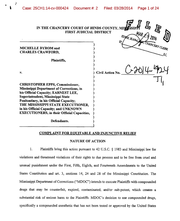The death sentences of Michelle Byrom (pictured) and Charles Crawford have put Mississippi in the midst of the controversy over what constitutes “cruel and unusual” in executions.
Wednesday, March 26, 2014
Mississippi's pending executions of Michelle Byrom and Charles Crawford—which are not yet scheduled—have mired the state in a controversy over what constitutes "cruel and unusual" in executions.
Anti-death penalty groups, such as the American Civil Liberties Union, argue that inflicting torturous pain to kill a person is little more than vengeance.
As a civilized society, the United States should do better than inflict excruciating death even on those who have done no better for their victims, they say.
"It is the ACLU's position that all five current methods of execution violate the Eighth Amendment's ban on cruel and unusual punishment, which prohibits the imposition of gratuitous pain," the group states on its website. "The most commonly used method of lethal injection, now the primary method of execution, violates that prohibition by using a sequence of drugs that creates an unnecessary risk of excruciating pain."
"[O]ne cannot know whether lethal injection is really painless, and there is evidence that it is not. As the U.S. Court of Appeals observed, there is 'substantial and uncontroverted evidence ... that execution by lethal injection poses a serious risk of cruel, protracted death. ... Even a slight error in dosage or administration can leave a prisoner conscious but paralyzed while dying, a sentient witness of his or her own asphyxiation,'" the site states.
Anti-death penalty efforts have made the execution process expensive, lengthy and relatively uncommon in the U.S., while making the methods for state-sanctioned killings as quick and painless as possible. But, although lethal injection may be more "humane" than hanging, electrocution or gas, preponderance of evidence shows that execution does not deter violent crime. Eighteen U.S. states and Washington, D.C., have abolished the death penalty.
The European Union has long banned executions. Under public pressure, manufacturers of sodium thiopental stopped selling to the U.S., whereupon the states substituted pentobarbital in its execution drug "cocktail." Danish pharmaceutical manufacturer Lundbeck stopped selling pentobarbital to the states in 2011. With supplies running short, states such as Mississippi have sought alternative methods to procure the drugs.
The effort has met mixed success.
On Jan. 10, Oklahoma executed Michael Lee Wilson, 38, using pentobarbital to sedate him as the first of three drugs that would eventual end his life. As the drug entered his veins, Wilson cried out, "I feel my whole body burning." In Ohio one week later, Dennis McGuire, 53, reportedly writhed in agony for 25 minutes, groaning and gasping for breath before finally dying.
McGuire's attorneys had attempted to stop his execution by arguing that Ohio's untested combination of drugs could lead to "air hunger," a medical term for suffocation. McGuire would experience "agony and terror" while struggling to breathe, they said. Apparently, that is precisely what occurred.
"He started making all these horrible, horrible noises, and at that point, that's when I covered my eyes and my ears," Amber McGuire told The New York Times after watching her father's execution.
Mississippi Department of Corrections records indicate that the state has turned to a Grenada compounding pharmacy, H&W Compounding/Brister Brothers Pharmacy, for pentobarbital, vecuronium bromide and potassium chloride used in executions. Brister markets non-prescription herbal supplements. Earlier this month, after MDOC resisted disclosing its supplier or the drugs' expiration dates, the Roderick & Solange MacArthur Justice Center in New Orleans filed suit on behalf of Byrom and Crawford to reveal the information.
With scant oversight and poor regulation, compounding pharmacies have aided in killing at least 145 people. In 2007 and 2008, 81 Americans died from tainted heparin compounded from Chinese ingredients. Sixty-four died in 2012 after receiving steroid injections. In both cases, the pharmacies obtained the drugs through legal means.
"If the first drug is not effective in achieving anesthetic 'death' for the prisoner, when you inject the paralytic agent, which is step two, in addition to having severe internal burning sensations, it is going to be the functional equivalent of suffocating somebody," Jim Craig, an attorney with Roderick and Solange, said. "In essence, you are stopping their muscles from working—including their lungs from taking in air."
"It really a very gruesome process," Craig added. "... Opacity prevents accountability, and that's exactly the problem."
"We have no assurance that this compounded pentobarbital is sufficiently potent and effective," Roderick and Solange attorney Vanessa Carroll said in a statement.
"This is an enormous concern because pentobarbital is the first drug administered during a lethal injection, and if it fails to work properly, the prisoner will be suffocated to death by the paralytic agent that is given next and may be conscious during the excruciating pain caused by the third drug, which causes death by cardiac arrest."
"No one has sentenced Ms. Byrom and Mr. Crawford to be slowly suffocated to death and to have their internal organs burned while conscious of it," Craig said. "That's not what they were sentenced to. They weren't sentenced to be tortured."
Read the story that drew worldwide attention to Michelle Byrom's case at jfp.ms/byrom.


Comments
RonniMott 10 years ago
Roderick & Solange have filed a new suit against MDOC. Here's the release, verbatim:
Constitutional Rights Violations Alleged in Lawsuit Against Mississippi’s Lethal Injection Drugs Use of Compounded Drugs Could Cause Excruciating Pain and Death by Torture
JACKSON, Miss. -- Two prisoners on Mississippi’s Death Row filed a lawsuit Friday against the Mississippi Department of Corrections (MDOC) alleging that the State’s plan to use “compounded” drugs to execute them violates the Constitution.
Mississippi uses three drugs for lethal injection: pentobarbital, vecuronium bromide, and potassium chloride. The first drug, pentobarbital, acts as an anesthetic to ensure that the condemned prisoner is unconscious and does not feel the effects of the second and third drugs, which stop the prisoner’s lungs and heart. Without an effective dosage of pentobarbital, the second two drugs cause excruciating pain similar to death by suffocation and then cardiac arrest. The prisoner would be paralyzed and unable to speak.
States that use the death penalty have had an increasingly difficult time obtaining pentobarbital since the manufacturer put controls in place that prohibit it from being used in executions. As an alternative, some states have turned to “compounding pharmacies” to make non-FDA-approved copies of pentobarbital.
Earlier this month, the Roderick & Solange MacArthur Justice Center sued MDOC for refusing to reveal the identity of the state’s supplier of lethal injection drugs. While the lawsuit was pending, it was discovered that H&W Compounding/Brister Brothers Pharmacy has supplied MDOC with the raw components necessary to make pentobarbital. Further investigation revealed that Brister Brothers Pharmacy most likely does not have the facilities and equipment necessary to compound a narcotic like pentobarbital from the raw materials.
(continued)
RonniMott 10 years ago
(continued from previous post)
The FDA has only recently begun scrutinizing compounding pharmacies, some of which have been accused of using ingredients from questionable sources, resulting in contaminated drugs that have harmed and killed consumers. The purpose of FDA regulation is to prevent expired, altered or counterfeit drugs from harming the public. The use of unregulated drugs in an execution raises the possibility that a prisoner will be paralyzed and killed without anesthesia. In the lawsuit, the plaintiffs highlight recent botched executions elsewhere in the country as evidence that experimental or compounded drugs are dangerous and may result in the torture of a paralyzed prisoner prior to his or her death.
“MDOC’s decision to purchase raw pharmaceutical ingredients and then secretly compound them at an unknown time and location by people with unknown training and credentials, increases the risk that the drugs will be ineffective or contaminated,” said Vanessa Carroll, attorney with the Roderick & Solange MacArthur Justice Center. “If the state’s pentobarbital is contaminated or sub-potent, prisoners will be conscious when the second and third drugs are administered, and they will experience a torturous death by suffocation and cardiac arrest. The constitution forbids cruel and unusual punishment, and MDOC’s decision to use untried drugs that may be counterfeit or contaminated creates an unnecessary risk of extreme pain and torture during an execution.”
Defendants in the suit, which was filed in Hinds County Chancery Court and assigned to Chancellor Dwayne Thomas, are Christopher Epps, the Commissioner of MDOC; Earnest Lee, the Superintendent of the Mississippi State Penitentiary where all executions take place; the State Executioner, whose identity is concealed from the public; and other unknown members of the State’s Execution Team. The plaintiffs are represented by Jim Craig and Vanessa Carroll of the Roderick & Solange MacArthur Justice Center in New Orleans.
Sign in to comment
Or login with:
OpenID